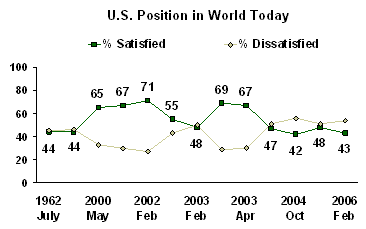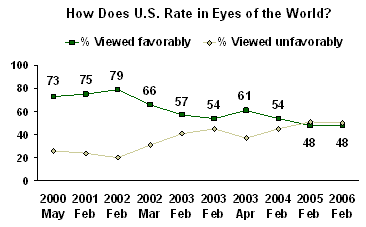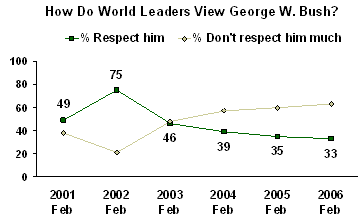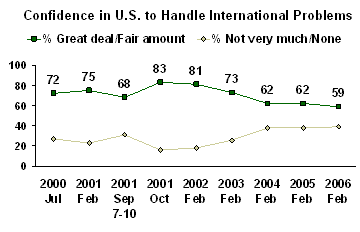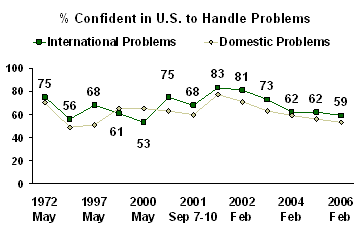|
Gallup
Majority Dissatisfied With U.S. Position in World by Lydia Saad February 22, 2006 GALLUP NEWS SERVICE PRINCETON, NJ --According to Gallup's annual World Affairs survey, updated Feb. 6-9, 2006, a majority of Americans today are dissatisfied with the United States' position in the world -- a significant change from the pre-Sept. 11, 2001 climate when most were satisfied. Also, Americans are now divided as to whether the United States is viewed favorably or unfavorably internationally. This represents a downturn in perceptions, especially when compared with the period from 2000-2002 when most Americans believed the United States had a favorable image. Two-thirds of Americans now believe that President George W. Bush is not respected by his fellow world leaders. Although Bush's earliest ratings on this dimension from 2001 were not high (and not dissimilar to those received by President Bill Clinton when he was in office), they are significantly lower today. On the plus side, a majority of Americans still have at least a fair amount of confidence in the United States' ability to handle international problems. This is down from the high levels recorded between 2000 and 2002, but the current level is similar to that recorded in the late 1990s under Clinton's presidency. U.S. Role in World Affairs As part of its annual World Affairs poll, Gallup routinely asks Americans whether they are satisfied or dissatisfied with the position of the United States in the world. This question originated in the 1960s during the Vietnam War era, at which time as many Americans were dissatisfied as satisfied with the United States' position. Gallup resurrected this trend in 2000 and since then it appears that public opinion about the United States' role in the world has gone through five stages -- with changes linked to the Sept. 11 attacks and 2003 Iraq War. These stages can be classified as "Pre-9/11," "Post- 9/11," "Pre-Iraq War," "Iraq-War Rally," and "Post-Iraq War." Before 9/11, Americans were mostly satisfied with the U.S. position in the world. In Gallup's 2000 and 2001 World Affairs surveys, approximately two-thirds of Americans were satisfied. Although the 9/11 attacks sparked unusually positive attitudes about the U.S. government, leaders, and culture for an extended period, Gallup's February 2002 survey found Americans' attitudes about the U.S. role only slightly more positive than they had been the year earlier. In the Post-9/11 period captured in Gallup's February 2002 survey, 71% were satisfied, up from 67% the year before. Public opinion turned more negative in the months leading up to the U.S.-led invasion on Iraq, initiated March 20, 2003 -- a change that could be tied to controversy about the apparent U.S. determination to go to war with Iraq despite substantial international opposition. As of late February 2003, 50% of Americans were dissatisfied with the U.S. position in the world; only 48% were satisfied. Once the military invasion began, public satisfaction on this measure surged in what might be called an Iraq-War rally. However, as a result, renewed controversy about the Iraq War and mounting U.S. casualties in the "post-war" period (after Bush declared the end of major combat on May 1, 2003), attitudes in February 2004 were slightly more negative than positive, and they remain negative in the current poll.
U.S. Image in the World Prior to 9/11, most Americans believed the United States was viewed favorably in the eyes of the world. This continued through February 2002 (four months after 9/11) suggesting Americans felt the world was supporting the United States following the terrorist attacks. Between February 2002 and February 2003, Americans' perception of how the world sees the United States became much less positive. The percentage saying the United States is viewed favorably dropped from 79% to 57% over this period. However, a large part of this change occurred between February and March 2002, when the perceived favorability fell 13 points, from 79% to 66%. A possible explanation for this abrupt decline in early 2002 is a Gallup survey released in late February 2002 documenting strong anti-U.S. sentiment throughout much of the Muslim world. As widely reported in the U.S. media at the time, residents of the nine countries included in the project -- Lebanon, Kuwait, Saudi Arabia, Jordan, Turkey, Pakistan, Iran, Morocco, and Indonesia -- had strongly unfavorable opinions of the United States and/or President Bush. Americans' impression of the country's image fell further, to 57% favorable, by February 2003. Perceptions remained at about this level through February 2004. Perceptions of U.S. favorability dropped further in February 2005 to 48% and remain at that lower level today.
International Respect for Bush Perceptions about President Bush's international reputation follow a somewhat different path from perceptions about the image of the United States. The difference is that prior to 9/11, Americans had fairly subdued confidence that the leaders of other countries around the world respected Bush -- whereas they had fairly robust impressions of the United States' image more generally. In February 2001, shortly after Bush took office, only 49% of Americans believed world leaders respected Bush, but this was in part because a high number (13%) had no opinion of how he would be viewed. This jumped to 75% in the aftermath of 9/11. However, this perception quickly subsided, perhaps in part because of Bush's promotion of the 2003 Iraq War. By late February 2003, more Americans believed Bush was not respected than said he was respected. This doubt has intensified in recent years. Today, only a third think Bush is respected internationally, while 63% disagree.
By way of comparison, on the two occasions when Gallup measured public perceptions of President Clinton's world image, the majority thought he did not garner much respect. Only 41% in September 1994 and 44% in May 2000 thought world leaders respected Clinton. Confidence in Federal Government Public confidence in the federal government to handle international problems is positive on balance. A combined 59% say they have either a great deal (10%) or fair amount (49%) of confidence in the federal government when it comes to handling international problems. However, confidence is low relative to recent readings on this measure. The current level of confidence is similar to the 62% confidence level recorded in 2004 and 2005. However, it is substantially lower than the 68% level Gallup recorded immediately prior to the 9/11 attacks in September 2001. At that time, 68% of Americans expressed a fair amount or great deal of confidence on this measure. The events of Sept. 11 then triggered a rally of public support for the U.S. government that sent this rating to its highest level (83%) in October 2001. Public confidence in the government on this measure has gradually declined since then.
The annual World Affairs survey also measures public confidence in federal handling of domestic problems. As shown in the graph below, this has followed a pattern similar to that of confidence in the government on international problems. Confidence surged for several months after Sept. 11, but has since dropped below where it stood just prior to 9/11. Public confidence in the government on domestic affairs was particularly strong relative to international affairs from 1998-2000 when America was experiencing an economic boom of sorts. In most other periods, the public has had greater confidence in the federal government's handling of international problems than of domestic problems, most recently by a margin of three to six points.
Survey Methods These results are based on telephone interviews with a randomly selected national sample of 1,002 adults, aged 18 and older, conducted Feb. 6-9, 2006. For results based on this sample, one can say with 95% confidence that the maximum error attributable to sampling and other random effects is ±3 percentage points. In addition to sampling error, question wording and practical difficulties in conducting surveys can introduce error or bias into the findings of public opinion polls. Commentary: |
